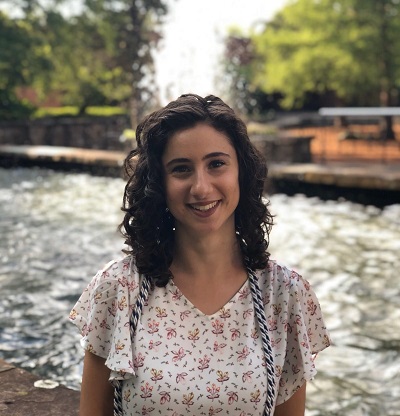Below we share how some of our faculty and staff have managed the virtual teaching and learning experience for their students. You will see that distance has not kept us from fulfilling our promise to students. While nothing can take the place of the Hendrix education our students receive on campus, both faculty and staff have done a remarkable job of adjusting to this new way of teaching and learning for Spring 2020.
Donor support helps us fulfill our mission, in the classroom and beyond.
Click on the links below to jump to each story:
PHYSICS
ART
FILM STUDIES
BASKETBALL
CAREER SERVICES
STUDENT PERSPECTIVE: ASHTON LEACH '20
STUDENT PERSPECTIVE: EMMA GIMENEZ '20
IN THE CLASSROOM
PHYSICS with Dr. Todd Tinsley, Professor of Physics
"In a typical semester, Dr. Spayde and I teach Introductory Physics II in a workshop format, in which students work through an activity guide in groups of three to make hypotheses, perform experiments, draw conclusions, and discover the laws of electricity and magnetism. We converted this process into something
that could be done remotely and asynchronously. This pandemic has certainly revealed the inequities among our students and, therefore, the differences in the way they are experiencing it—from mild inconvenience, to having to get a job, fighting siblings for access to the one
computer in the household, or driving to Starbucks for wifi access. Some students found “groups” and worked through the activity guides over facetime, zoom, or teams. Others did them on their own. The students still had to make hypotheses, but I filmed my own kids
doing the experiments for the students to watch and then draw their own conclusions."
(See Experiment 1 HERE.)
(See Experiment 2 HERE.)
The videos of the experiments were an important component of the class. Dr. Tinsley was able to carry these out with the help of some special helpers, as he explains here,
“The first link features my 14-yo Taylor, who helped me for like one day, and we just happened to catch Toby doing her tik tok thing in the background. Toby became a great lab assistant and would help me film a lot of the demonstrations. The second video involves a gag that she came up with, one
where it looks like I jab her in the eye with a meter stick. In the next video of the students’ activity guide, Toby has a bandage on her eye. It was hilarious!”
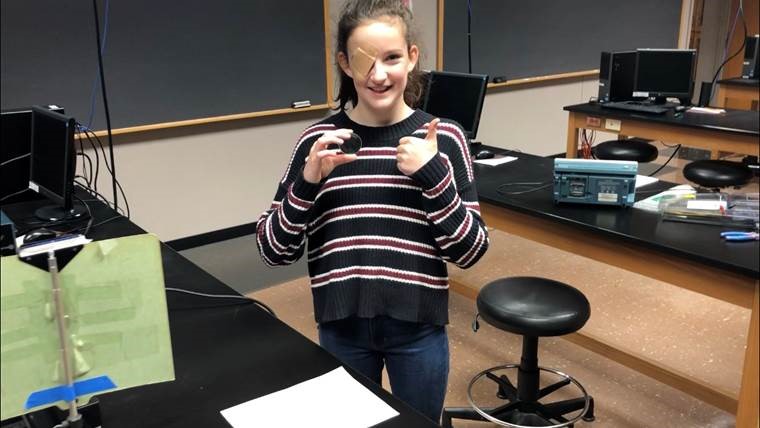
Together, Dr. Spayde and I held virtual office hours for 6 hours during regularly scheduled class periods during which time students “come in” to ask questions; I usually would share my screen, let them take control and sketch solutions and we would talk through it. Twice a day, we met with our student teams to
work a problem together collaboratively, and maybe 60% of our students were able to be there, for a variety of reasons. Everyone is doing all they can under very challenging circumstances. We have a great Society of Physics Students Chapter who’s done their best—trivia
nights, sending updates, etc. I can only say that we have all tried our hardest to give these kids a true Hendrix experience.
ART
Matthew Lopas, Professor of Art, held synchronous classes conducting drawing demonstrations with a screen shared iPad. He sent this screenshot which shows him explaining and demonstrating how two point perspective is used in observational drawing.
.jpg)
FILM STUDIES with Dr. Kristi McKim, Professor of English-Film & Media Studies
When I first read the invitation, from Hendrix’s Office
of Development, to describe my teaching under these circumstances, I confess
that I laughed out loud at the incongruity of the ask in proportion to my
then-present reality: it had been a challenging afternoon. Still in pajamas at
4 p.m., I was juggling a steady stream of school emails, holding my napping
toddler, typing with one hand, and homeschooling my kindergartener rather ineptly.
As a mother of young children, teacher, and English department chair, I felt to
be failing miserably at these converging responsibilities, concentrated in our
home, now newly-conceived as a kindergarten, preschool, college classroom, and
office. Though this opening confession dwells on my felt inadequacy more than
sense of achievement, I begin here so as to foreground my approach to teaching
during the pandemic: a willingness to acknowledge the challenge and to
appreciate our new and shared vulnerability.
Teaching and learning (nay living) in these times means
being vulnerable in ways that I cannot overstate. It means sharing questions in
a faculty online forum in an effort to learn new-to-me platforms. It means a
crash-course in best practices—maximizing equitability, access, participation,
engagement—in teaching online. It means a dozen outtakes of a “welcome” message
to my students, and finally settling on a version—wholly amateur, imperfect in form, sincere in message,
and with unscripted visits from children—that might emphasize to my classes
that we’re finding our way together, and that I’m also learning. Teaching with
vulnerability means sharing compassion with students whose newly-configured
lives involve caring for sick relatives or younger siblings, or working forty
hours a week while taking a full schedule of classes, or suffering the fallout
of electricity-disrupting storms, or driving to McDonald’s for free Wi-Fi. I
revised my writing assignments to allow students—if they chose—to lean into the
uncertainty, fear, and concern that they're feeling at this moment, to explore
what they're watching and turning to (film-wise) as a kind of antidote to or
immersion within the pressures of this time. Given my students’ responses to an
extensive survey of their concerns, access to technology, and hopes for the
virtual semester, I blended weekly sets of slides with audio narration (creating
a smaller file to download or stream), with clips and links to related videos.
I found free films that students could view without additional cost of rentals
or streaming subscriptions, and I changed our weekly screenings to feature
films to which students already had access. I
wanted deeply to reach everyone, to lose no one.
Teaching became, more than ever, an exercise in carving
down my discipline and my pedagogy to its most urgent: why does studying film
and writing matter? How might a heightened perceptual attention yield a
meaning-rich world, and how might the meaning we find and make become
shareable? How might classrooms—and broader communities—grow stronger through a
measured practice of cultivating sensitivity to our individual and collective
hopes and dreams, fantasies and fears, in ways that discussing and writing
about films can exercise? I taught toward these questions, which gave me (and,
I hope, my students) a sense of purpose in these trying times. During our (optional)
shared weekly class meetings, a good portion of our opening discussion involved
a simple check-in, a how's-everyone-holding-up point of return and
compassion. Though students were variously exhausted, scared, and lonely, these
meetings felt like a reunion, a virtual space hardly as fancy and optimal as
our luxurious brand-new Hundley-Shell Theater in the Miller Creative Quad but
nonetheless a site of reconnection. And we couldn’t not remark upon the
wildness of it all, the fact that studying film involves studying the changes
and subtleties in close-ups and long takes, say, a scale and duration now
defining how we appeared to each other, human forms as audiovisual presence!
Each week, our conversation involved the assigned material (readings, screenings,
clips, questions) as a foundation from which to address how films can assuage
or heighten our fears, can help us to imagine healing, can distract us from or
immerse us within the anxiety of our times. In keeping with the original shape
of my classes, students wrote weekly papers; yet their papers in the time of
Covid-19 expanded to include reflections on, say, watching Casablanca
with their family, discussing together the Hollywood-glossed political romance
that reimagines heroism in a time of trial, or the dreamlike swoon of If
Beale Street Could Talk that conveys an existential and spatial isolation,
one that afforded students a kind of kinship with the screen. As with all
classes and audiences, students saw themselves in relation to the screen; yet,
during a time of social distancing, these screens became more emphatically a
screen from and upon the world.
I am stunned by, proud of, and
humbled at students’ courage in making their work matter this semester. Thanks
to the support of my also-working-from-home husband (Mark Barr, Hendrix ’92, a
software developer and novelist, now with inadvertent homeschooling experience), my children
made guest appearances only in the final minutes of class sessions, sometimes
wearing costumes, always delighted to see the faces of my students. Thanks to
my inspiring Hendrix colleagues and ever-helpful staff, I felt empowered and
excited to make the best of this difficult situation. Thanks to the grace,
perseverance, curiosity, and sensitivity of my students, I learned as much as I
taught, something true of every semester, yet particularly acute in this time
of heightened everything.
I've provided an excerpt of the syllabus from Intro to Film below.
SYLLABUS:
SPRING 2020: ENGF 269 / INTRO TO FILM, REVISED
First things first: let’s be mindful of the circumstances
that necessitate this virtual learning environment. Our world and our daily
experiences have changed dramatically since we began the semester. We’re humans
before we’re students and professor, and I have great concern for your
well-being in this time of emergency and trial. Things that we thought we’d be
doing right now, things to which we’d looked forward, are no longer happening
as we had planned and hoped. Though we share this global pandemic, its stress
impacts each of us in unique ways, some of which we know, and some of which we
might not yet be able to (or want to) name or measure. I have redesigned our subsequent weeks
keeping in mind several things:
1) even if we think otherwise, none of us can
work as if we’re not also living through a pandemic;
2) learning can be an
extraordinary exercise of hope;
3) our classroom community might offer refuge
and comfort;
4) both film and writing might afford opportunities for whatever
combination of escapism or focus we need right now;
5) from what I have read and learned, a truly polished and professional online course takes months to prepare well, and—even still—I profoundly favor the spontaneity and intimacy of face-to-face learning. In this revision, I have tried to salvage the bones of the course, our learning goals and qualities of experience that you've written to me that matter most to you, without adding any undue stress or hurdles or complications.
6) The changes to the course should not cost you any additional money for rentals or film purchases. Without weekly screenings or DVD library access, I cannot realistically keep our original screening schedule.
7) I want to do what's best and realistic for the class as a whole, mindful of my own changed work environment, my professional responsibilities to and care for the inquiry of our course, and my human concern for you and for our communities.
In terms of our course, what remains
unchanged:
- My dedication to you individually and as a classroom community;
- Our
collective efforts to learn together;
- The opportunity to learn about and
discuss films;
- Expectations that you work regularly to read, write about and
screen film.
My promise to you: So long as you submit your work, abide academic integrity, and are present in some way (see above), your grade will not go down in this final month of the course. If you're unable to access materials or participate as indicated above, be in touch with me in advance and not in retrospect. I am immensely supportive, merciful, and flexible in this time of trial, for all of us.
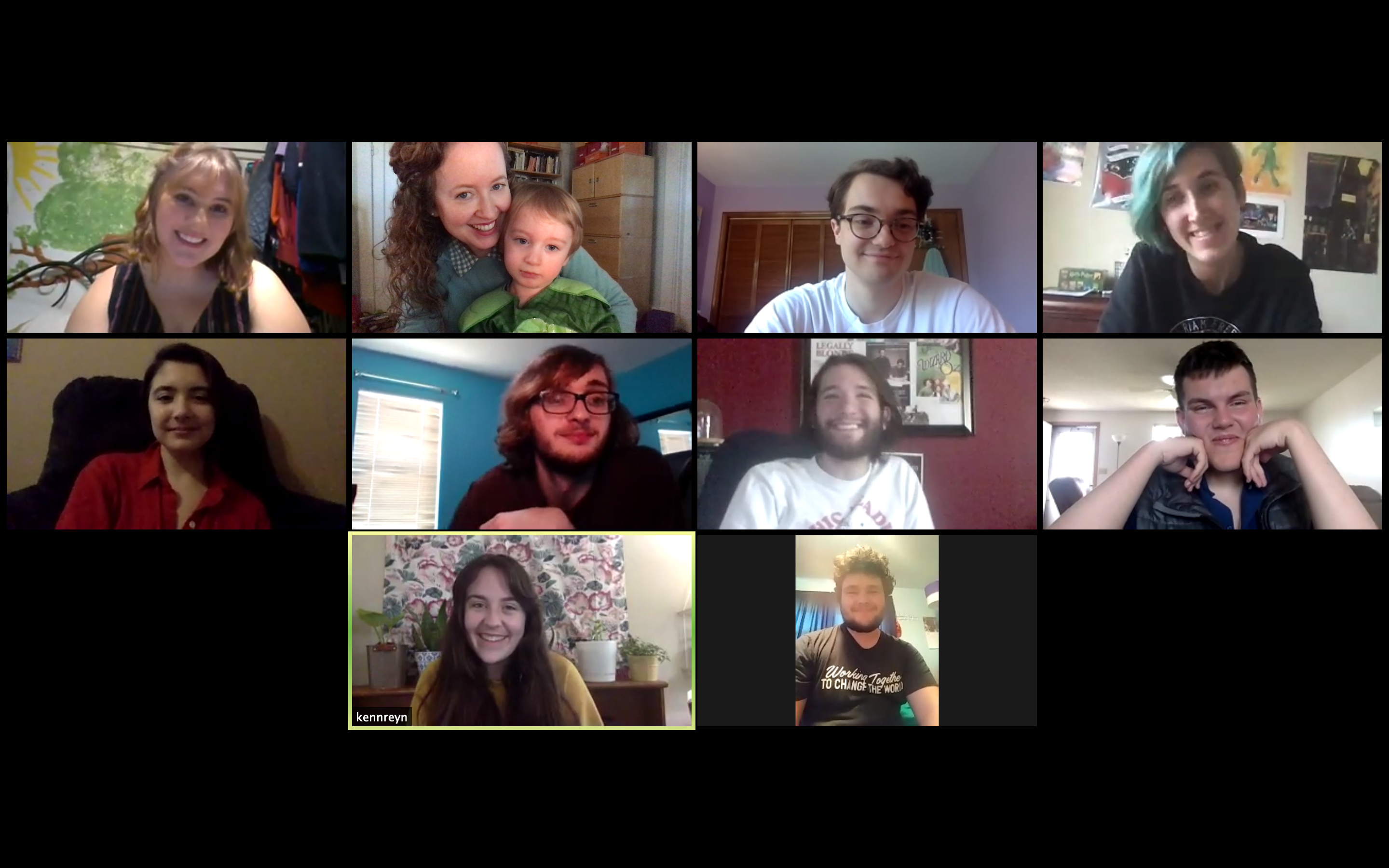
AND BEYOND
BASKETBALL
Coach Thad McCracken and the players on his basketball team held weekly zoom meetings in addition to regular text messages and phone calls. “Our conversations are mostly about personal things. We talk about their workouts, classes, grades, the usual things, but more often we talk about their families,
what they’ve been doing to stay busy and what’s going on with them in general.” He sent a screenshot of one of their team meetings.
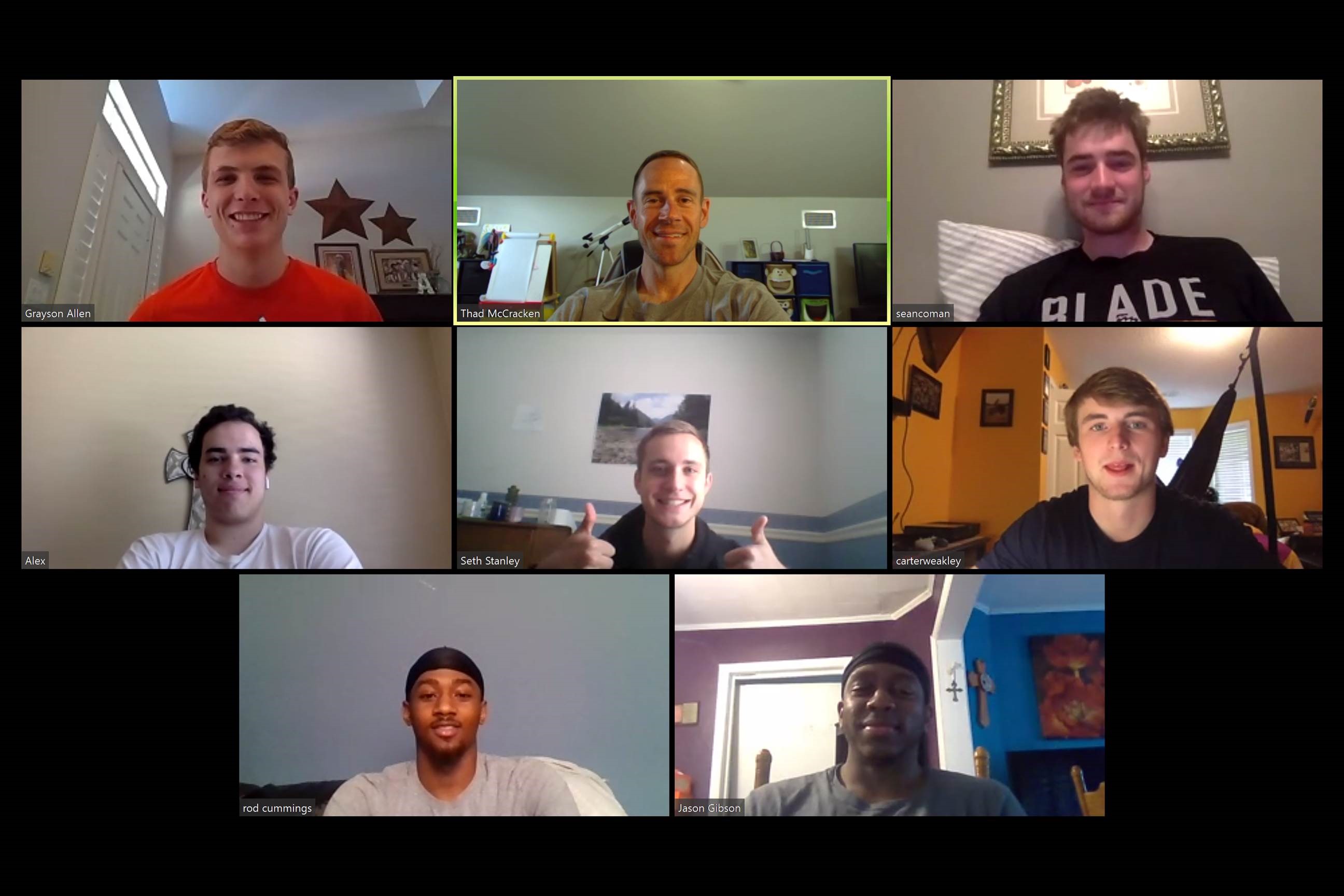
CAREER SERVICES with Leigh Lassiter-Counts, Tricia Burris, and Amanda Moore
The Career Services Team reports having a lot of virtual meetings—working with seniors graduating and entering the job market; young alumni completing gap years; students looking for internships; alumni from as far back as the '80s who are reworking career plans due to COVID; and graduate
school applicants as testing processes are changing and graduate programs are altering admission requirements and deadlines. They also have been working with a number of potential employers—non-profits and companies in the tech sector, to name a few—in fact,
46 new jobs and internships were posted to HireHendrix in one day just recently. "There are still great jobs available, and lots of places are hiring; we are just having to re-think—and be more creative—in how we help students and graduates wade through these waters," says Leigh Lassiter-Counts, director of Career Services.
Their team recently promoted on social media an opportunity for Hendrix alumni to submit job leads that can be shared with recent graduates. The effort generated responses from a wide range of alumni, from the classes of '92 to '19, and netted about 30 job postings as well as some offers to personally connect with interested students. (It's not too late to participate if you're interested! If you know of any job leads for Hendrix alumni and graduates, share them HERE.)
Below, Leigh shares a photo her team submitted for the senior slide show that reflects their sentiments during these challenging days. She also provided two screen shots from her meetings with students. In one, she is talking with Hendrix junior, Innocent Nsabimana, to review his resume. Innocent was approached by Google about submitting his resume for potential job offers for next spring after he graduates. In the other, Leigh is talking with Mayra Valezquez, who just completed her freshman year, discussing summer plans and other details related to the prestigious STEM Scholar program that Mayra participates in.
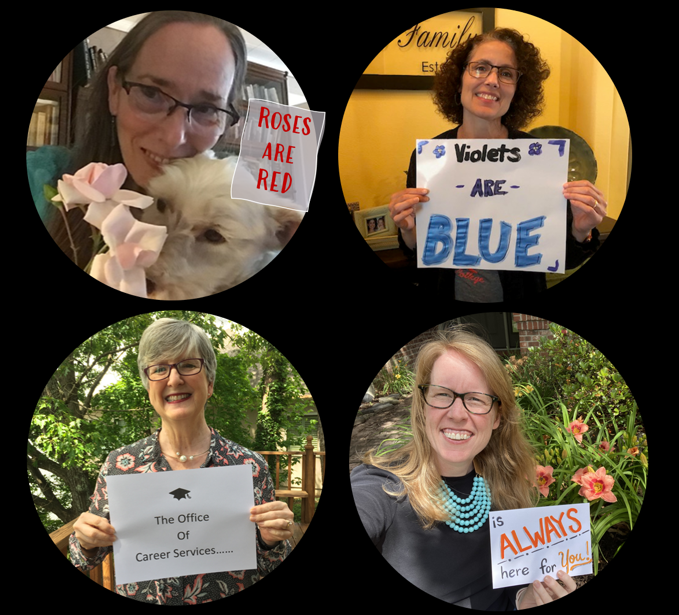
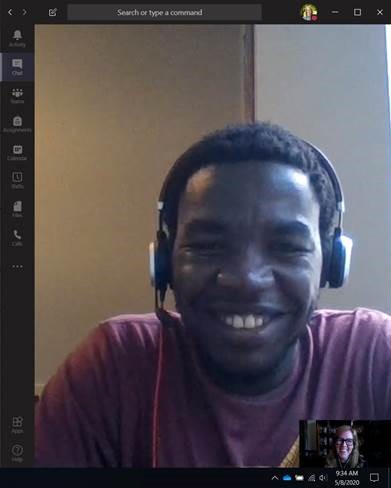
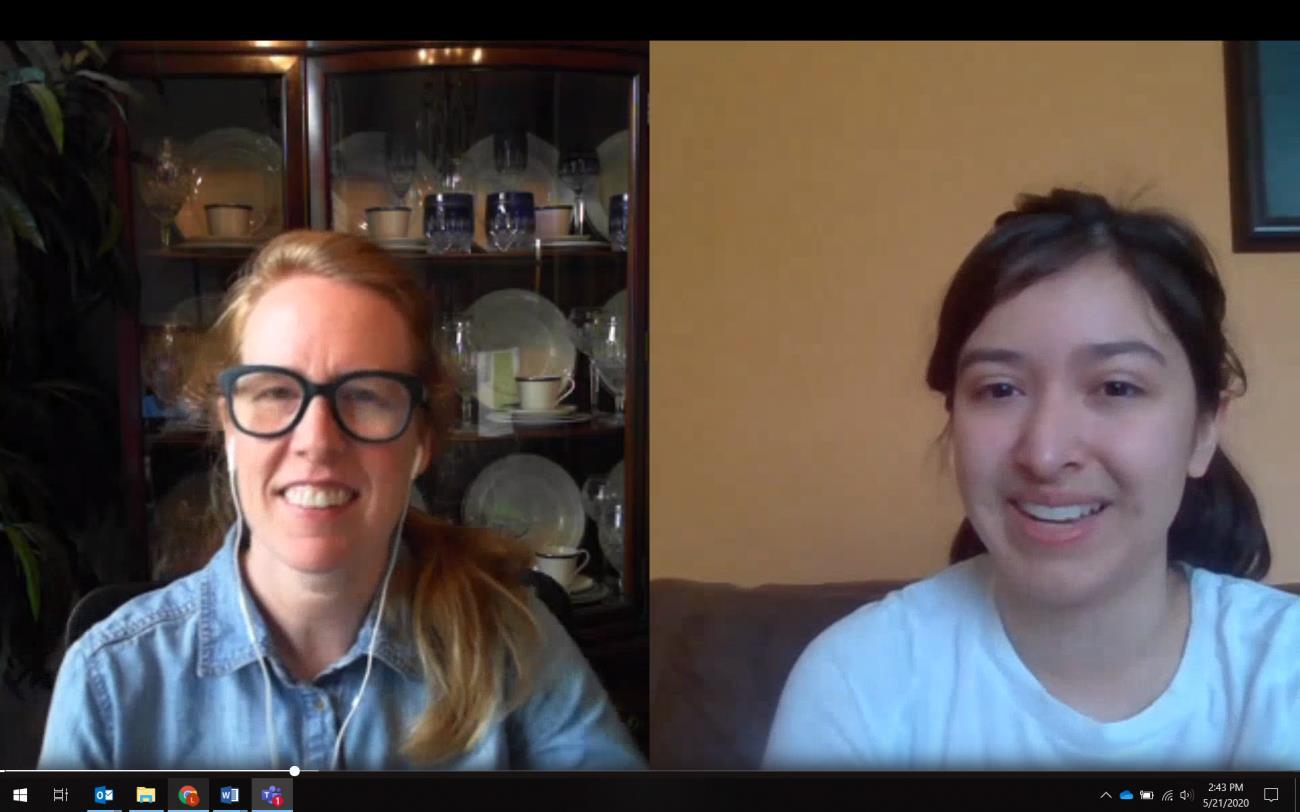
STUDENT PERSPECTIVE:
Hendrix seniors, Ashton Leach of Benton, AR, and Emma Gimenez, of Hot Springs, AR, share a glimpse into their experiences during their final semesters as Hendrix students, which also happened to be in the midst of a global pandemic.
Ashton Leach:
“The transition hit hard, especially as a senior. Goodbyes were stripped away and most days were tear-filled as opportunities that I had once had (internships, jobs, grad school) started crumbling around me. I felt broken and ashamed for being sad, felt worse for not feeling as productive at home, but my
Film & Writing class, taught by Dr. Kristi McKim was constantly the highlight of my week. I have always loved film, and you'd think that with this extra time I would be thrilled to watch as many movies as possible! But I couldn't. It felt like work that I was not getting to share with others, and
half the magic of movies is talking about them. So I sat in my bed, on my couch every Thursday waiting to see my classmates once again together on the screen. I am thankful, above all, Dr. McKim was understanding. We talked about films because we wanted to, but we also talked about life and feelings
and laughed together and cried so many times. They were always tears of joy though. The last class of my undergrad career happened over a zoom call for Film & Writing, and I cried. I cried trying to thank my classmates for their championship, I cried trying to tell Dr. McKim how she has changed my life so
drastically in such a short amount of time, and I cried because I could not hug them goodbye. I was not alone, other seniors felt the pain of the goodbyes just as I did and most peers were misty-eyed. I wish that I could have been with them all at that moment, but I am happy that we loved greatly this semester.
Distancing has been hard, a major shock to the system no doubt, but this class gave me an opportunity to write productively on the pandemic and on film. Dr. McKim truly made the best out of a terrible situation, and she let us all know how loved we were. I will cherish these memories and I am thankful that my last
class was with this group who loved and laughed and cried and wrote beautiful and powerful words alongside me. I am all the better because of them.”
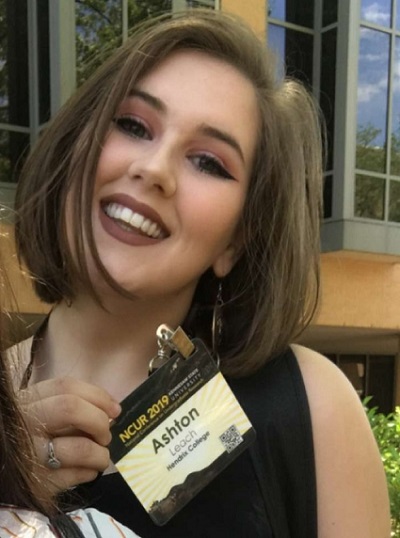
Emma Gimenez:
“At first, the shift online was awkward and confusing as I had never done anything like it before. However, all of my professors have been incredibly helpful and supportive during this time, allowing flexibility and understanding when needed. I believe I am not alone as a student when I say that it was difficult
to stay motivated and focused during this time, without the supportive environment at Hendrix and with increased feelings of anxiety and uncertainty. I found I had to make an increased effort to meet the level of achievement that came easier before, but this was met with increased sensitivity to our
limitations by professors and conversations about how to reach everyone's needs. My experience in my independent study with Dr. Peszka was very similar to my other classes, as professors have been open and willing to work individually with us to make sure we were receiving the help and flexibility we
needed. I am incredibly grateful to all my professors as they are the ones that have made the transition and this time as comfortable and supportive as possible and have made me be proud to call myself a Hendrix graduate.”
